South Africa prioritises digital inclusion for rural and disadvantaged areas
DIGITAL DIVIDE

Deputy Minister of Communications and Digital Technologies in South Africa Mondli Gungubele said that the Government is committed to internet connectivity to all rural and disadvantaged communities.
Image: Yogashen Pillay
Deputy Minister of Communications and Digital Technologies, Mondli Gungubele, has reiterated the government's commitment to enhancing internet connectivity across rural and disadvantaged communities in a bid to bridge the digital divide.
Speaking at the South Africa Internet Governance Forum held in Durban on Wednesday, Gungubele stressed the significance of this initiative as the nation prepares for the World Summit on Information Society review process.
“Digital governance is a global factor that our regulatory, ethical and social frameworks can often keep in place. We are here as South Africans and as global citizens to reflect on the challenges we face. We are here to respond to students, to ensure that they are free and free in the context of research,” he said.
Gungubele added that the government has made significant strides in embedding the multistakeholder model in internet governance approach, ensuring that all voices from the rural and township communities and metropolitan leaders are heard in shaping our digital future.
“The emergence of the global digital compact presents us with critical questions. Should governance of the internet shift towards a more centralized intergovernmental structure? Our position must be clear. We continue to stand for an internet that is open, secure, rights-based and accessible to all.”
Gungubele said the forum was critical in South Africa's digital landscape.
“Significance arises from the growing importance of the internet in driving relations advancement across various sectors, such as commerce, education, healthcare, governance, and entertainment,” he said.
“Since 2012, internet access has been acknowledged as a fundamental human right, aligning with the United Nations Human Rights Council's affirmation of individual freedom of expression and opinion.”
Gungubele added that research showed that technology will disrupt 75 million jobs, but create 130 million digital jobs.
“The utilization of AI technology could either alleviate or exacerbate existing disparities, particularly in terms of employment and essential services accessibility. We are currently confronted by AI's increasing presence; tools like ChatGPT are becoming increasingly proficient in tasks traditionally performed by humans, such as coding, software vulnerability identification, and content creation. As AI progresses, concerns arise regarding potential job displacement among knowledge workers,” Gungubele said.
Moreover, he asserted the necessity for educational and training initiatives aimed at preparing the workforce for an AI-centric future. He concluded by stressing the importance of collaboration between government, industry, academia, and civil society to create policies that address the challenges posed by AI while maximising its benefits for the workforce.
Mpilo Sibiya, a representative from the KZN Premier’s office, said that the province was advancing digital inclusion in rural communities through the traditional authorities connectivity project.
“This initiative provides traditional leaders such as Amakhosi with access to government services and direct communication channels with the provincial departments. So far, 23 international council facilities have been connected through the government,” Sibiya said.
“Moreover, libraries across the province are being transformed into digital hubs with full cyber credits assisting the residents with digital literacy, job searches, and educational resources. This effort has made a significant impact, especially in rural areas where access to digital infrastructure has been limited.”
Sibiya added that despite some challenges, particularly around budget constraints, KZN has been committed to expanding digital infrastructure, including inter-literacy across the province.
“Plans are already in place to build and connect more libraries, ensuring that digital links continue to grow and reach every corner of KZN. Our province is aligned with South Africa's NDP to build an inclusive economy that drives sustainable development and shared prosperity,” Sibiya said.
“We are investing in technology access, new skills, and innovation to improve the digital divide and create a future for all. By embracing digital transformation, we are building a connected, capable, and competitive province that leaves no one behind.”
BUSINESS REPORT